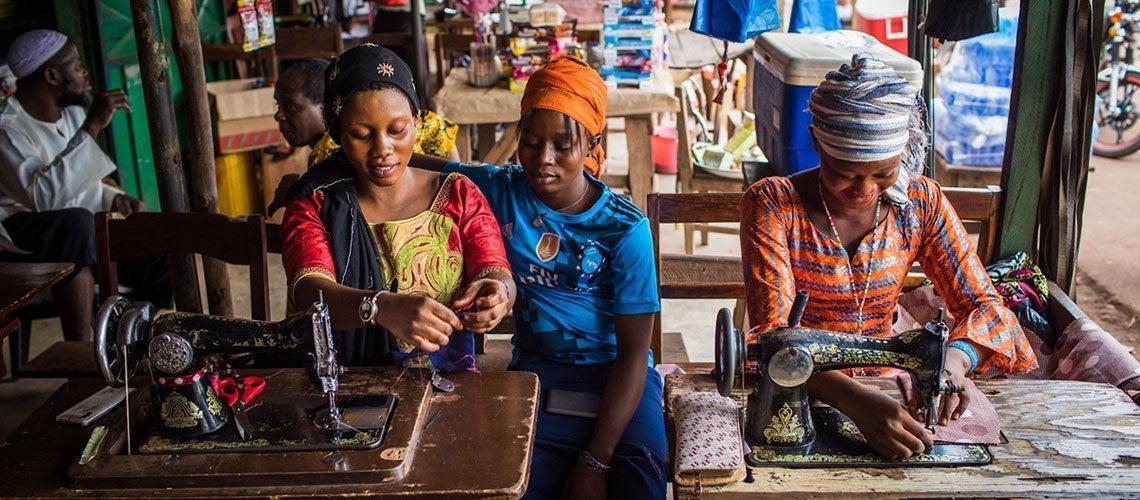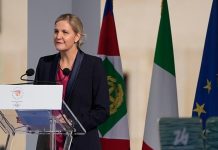Africa-Press – Eritrea. Young people between the ages of 18 and 35 make up two-thirds of Africa’s population. The number is expected to reach 75% by 2030. They live in an environment of rapid urbanisation, high unemployment rates and poor state services. These are some of the factors that incline young people towards political involvement – as seen most recently.
As the Kenya example illustrates, youth can use protests, advocacy, or voting to express their citizenship. At its most basic, citizenship is a legal recognition by the state that gives individuals rights and obligations.
But it’s more than that. Citizenship is a multifaceted, malleable identity, one in which citizens are always transforming and becoming through actions that generate a sense of belonging.
We have a combined 90 years of research experience investigating democracy and civil society, health policy and advocacy, and religion and politics in Africa. Our recent book, Africa’s Urban Youth, uses research in Ghana, Uganda and Tanzania to answer this question: how do youth understand their citizenship amid challenges (like growing economic inequality and uneven democratic progress) and opportunities to shape the continent’s future?
Drawing from extensive fieldwork in Accra, Kampala and Dar es Salaam, this book investigates how Africa’s urban youth cultivate a sense of citizenship in this challenging environment, and what it means to them to be a “good citizen”.
In interviews and focus group discussions, African youth, activists and community leaders explained how income, religion and gender intertwined with their sense of citizenship and belonging. They crafted a citizenship identity that was rooted in their relationships and obligations to each other and the state.
We found that citizenship is a fluid identity that stretches beyond disappointment, protest, or voting. Despite being portrayed as either disillusioned, manipulated trouble-makers or idealistic agents, youth citizens exhibit a rich identity rooted in social practices. They are not waiting on elders to solve their problems. They look towards the future, while acting on obligations to improve the here and now.
What we found
We conducted 39 focus groups with people aged 18 to 35 in higher- and lower-income neighbourhoods in Accra, Dar es Salaam and Kampala. We also carried out 33 interviews with youth activists, 28 interviews with pastors who work with youth, and five case studies of youth organisations. We wondered: from the vantage point of African youth, what does it mean to be a good citizen? And, how does being a good citizen affect their actions in the local community and country? Do they view good citizenship to be different for men and women?
We paired this qualitative data with Afrobarometer results on youth community involvement and political participation. Our objective was to use the stories, impressions and experiences shared by young people to uncover the nuance and complexity of the patterns found in countrywide survey data.
We found overarching trends when we probed views of “good citizenship”. Although many began with legalistic replies — “a good citizen has an identification card” — most quickly moved to describing citizenship as daily actions within their own spheres of influence.
This citizenship crosses public-private boundaries, revealing itself in the household, market, workplace, classroom, worship space, street and voting booth.
The good citizen: Our respondents repeatedly described citizenship as active. The good citizen cares for a sick co-parishioner, lends a friend money, picks up trash in the community, patrols the neighbourhood at night to thwart thieves (for men) and raises children (for women). The good citizen also shares ideas at community meetings, prays for the nation (for churchgoers), gets an education, starts a business, and/or employs others.
For respondents, these actions helped to “build the nation”, an expression used predominantly by Tanzanian and Ghanaian respondents. This is perhaps due to its use by those countries’ independence leaders, Julius Nyerere and Kwame Nkrumah.
Our youth respondents imbued citizenship with a moral tenor. Many asserted that good citizens not only follow the law, but they also greet their neighbours, maintain peace in the community, and, for women, do not drink or stay out late. Tanzanians in particular emphasised these moral themes, as did mainline Christians (even more than Pentecostals). Youth were acutely aware that some elders urged this “future generation” to act appropriately and contribute to communal projects such as work days, while also denying youth status in public spaces.
Voting: Youth in our study spent little time describing good citizenship as voting, advocating or protesting. Ghanaians were slightly more talkative about these activities. Youth across the three countries viewed voting to be an expected, moral action with a social component. This echoed Afrobarometer findings that about 80% of youth do vote (a rate 5-8 percentage points below that of older adults).
They linked advocacy and protesting to their daily struggles and obligations. Protesting unfair economic practices reflected the need for money to help family or neighbours in need, an act of good citizenship. Advocating about domestic violence laws or mental health funding was rooted in personal experiences that pushed some youth to claim rights from the state.
Income: Income matters for how youth define their citizenship. Lower-income youth were more likely to stress community actions and obligations, while higher-income youth emphasised that others, particularly lower-income people, must obey the law.
Perhaps due to Ghana’s higher average income, its youth mentioned specific communal activities less than the broad notion that citizens build the nation. Regardless of income, youth – particularly men – asserted that entrepreneurship and hard work indicated good citizenship.
Coming of age with few state services and free market policies, they had absorbed neoliberal themes espoused by religious and political leaders. Neoliberalism, though, meant that good citizenship seemed unattainable to the unemployed youth who faced significant economic obstacles.
The bottom line
Three years of fieldwork in the three countries revealed that youth citizenship is distinct. Young people speak of specific challenges such as employment, obstacles to political leadership, and marriage expectations. But they are not despondent.
They also stress age-related contributions to building the nation, such as caring for children or doing physical work to improve their neighbourhood.
As youth continue to engage ever more boldly in politics, they will bring their citizenship understandings with them. Their productive and often visionary citizenship efforts reflect the value they place on both public and private actions, as well as their desire to see themselves represented as full citizens of their countries.
Theconversation
For More News And Analysis About Eritrea Follow Africa-Press







